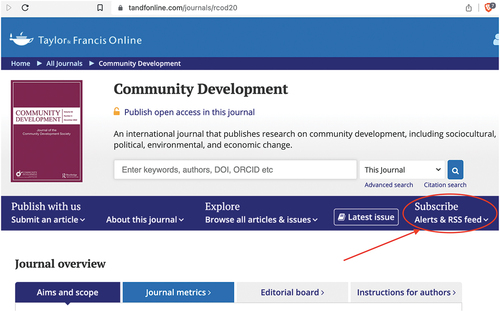Dear Community Development Readers,
Thank you for your continued commitment to our publication in this new year. I have received word from our publisher that our journal continues to improve in reach and rapport among our respective categorization(s) in the literature. Our journal would not be in such a positive position without the strong growth- and inclusive- mindsets among our editorial team and board. I offer continued thanks to our editorial team: Managing editor, Dr. Sofia Kotsiri; associate editors, Drs. Brien Ashdown, Bryan Hains, Kristina Hains, and Matthew Mars; and, book reviews editor, Dr. Anne Silvis. Thanks also go out to our editorial board members, which I will be contacting for more reviews and insights on how to further enhance our journal in this new year.
This issue contains articles across three areas: Theoretical and Critical Perspectives; Research Articles; and, Community Development (CD) Practice. Liam Maclure provides an exceptional theory-building piece on asset-based community development (ABCD) and power systems. The article, in particular, focuses on targeting oppressive power systems and looking at the dark(er) side(s) of ABCD. Our journal is hosting an upcoming thematic issue on the dark(er) side(s) of CD, and this work provides a great reference for those interested in those areas. I really want to see more pieces like this providing greater critical perspectives regarding our collective work.
Our research articles focus strongly on neighborhoods or particular communities of place. In the Hague, Netherlands, Slingerland and colleagues write of the power of stories leveraging a novel reflective storytelling framework bridging reflection and connection among community members. I really appreciated this article and reminisced on my first publication in Community Development, also concerning the power of storytelling (Pstross et al., Citation2014). In Cincinnati, Ohio, Ravuri conducts a unique analysis of neighborhood change before and after the Great Recession of 2008. She unearths important insights around urban revitalization and class differences connected to household welfare. In the Southwest United States, Wagner, Felderhoff, and Solomon describe how to address mental health and homelessness, specifically among veterans. They share their collective impact model and insights from a community navigator program for veterans based on high quality interviews with key stakeholders. Our final research article is a case study regarding the Pavement Dwellers Center, which services homeless persons in Bangladesh. The authors share a multidimensional and practice-based framework and a particular project that provides promises, reflections, and opportunities for scaling future impact.
In a newer, or at least renewed section for each issue, three CD practice pieces are featured. Authors when they submit these works can request either editorial or peer-reviews. Some of the articles in this issue were in process with CD Practice, a former publication of Community Development Society (CDS) (see archive: https://cdsociety.org/publications/publication-archive/#archive-cd-practice), prior to our journal taking on the role of publishing those pieces. Our journal will include more pieces like these, because practitioners deserve prominent places to feature their work from program evaluations to community case studies to educational pieces, among others. I contend, with the support of our editorial team, that these pieces deserve the same regard among all of the other pieces we publish, as the authors’ efforts are equivalent.
In this issue, White and Hill provide readers with an additional article regarding veterans. They discuss a cognition for coaches physical activity program. This program among other goals looks to improve sense of community and social capital among veterans, especially wounded veterans. On a different note, McCall and Hoyman discuss community development financial institutions (CDFIs), which have not been discussed much in our journal (if at all, recently). Their article provides a primer for how to systematically evaluate CDFIs to enhance both future research and practice. Hackney, Friesner, and Patil connect research to practice, which is why they are featured in this section, but their piece is also a strong research article. They analyze consumer bankruptcy filings in Spokane, Washington noting important differences over time in bankruptcy filings and related connections to income and diversity. These articles keep our collective work grounded in the real lives of community members, workers, leaders, and other stakeholders.
In recognition of their good work to come, our full editorial board for the year is listed (see ). I would love to see our editorial board expand further beyond the United States, so please reach out (e-mail: [email protected]) if you have individuals to recommend. To help us out, please subscribe to our alerts and/or RSS feed on our website (See and our website: https://www.tandfonline.com/journals/rcod20). Thank you for your further support.
Figure 1. Where to subscribe for journal alerts.

Table 1. Editorial board for Community Development (Citation2023).
